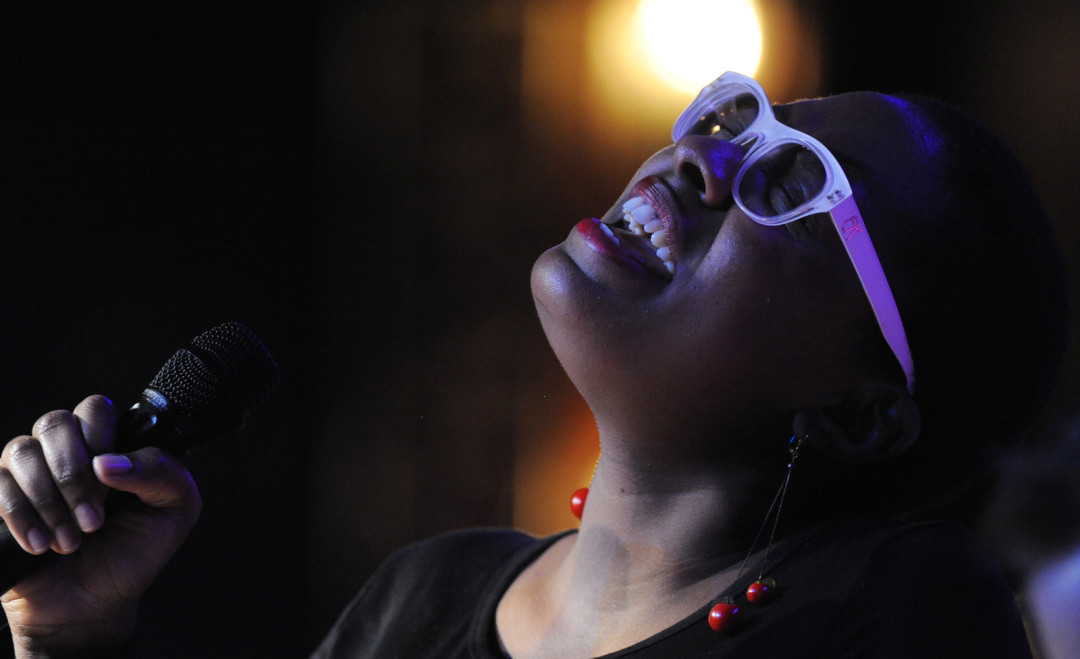Profile: Cécile McLorin Salvant at PDX Jazz Fest

Image: J.R. Photography
With her trademark white glasses and a voice both stunningly precise and fearlessly pliant, the young Brooklyn chanteuse Cécile McLorin Salvant is exploding onto the jazz scene with an authority and musicianship far beyond her years—and she’s doing so not only by cutting her teeth on the classics, but by rediscovering some of her own. Since winning the prestigious Thelonious Monk competition in 2010, the 24-year-old has toured the country with her trio, performed with the Jazz at Lincoln Center Orchestra, and been the subject of two glowing profiles in the New York Times (in the most recent, critic Stephen Holden gushed that McLorin Salvant “has it all”). Her most recent album, WomanChild, is currently contending for a Grammy.
McLorin Salvant's unusual background has drawn as much attention as her gorgeous voice: she has spent most of her life studying classical music. The Miami-born child of a French mother and Haitian father didn’t begin to pursue jazz until she went to college in France and began to study with teacher and reed player Jean-François Bonnel. For the young singer, exploring all the genre had to offer really meant exploring her own voice. “I find that in jazz you have a lot more options because it’s not really codified,” McLorin Salvant says. “You can sing in a whisper or belt it out. That’s what really interests me: how flexible the human voice is, how many different things we can do with it.”
Honing her chops in French nightclubs and performance halls helped develop the expressiveness and malleability of her singing. “I was singing in English for a non-English speaking audience,” she says. “Something in my performance had to explain what the lyrics of the songs meant and what the stories were.” The result is a total embodiment of character, from vocal inflection to facial expression and posture, that lends new gravity to seemingly simple words—and that convinced executives at Mack Avenue record label to put out WomanChild in 2013.
McLorin Salvant has drawn numerous comparisons to golden-era singers like Billie Holiday, Sarah Vaughan, and Ella Fitzgerald (and for once, critics really seem to mean it) not only for her vocal skills, but for her choice to focus on early standards, breathing new life and new meaning into forgotten songs from the ‘20s and ‘30s. Some might think that confining oneself to that lineage might be limiting, but for McLorin Salvant, it’s just the opposite. “There’s just so much that’s gone on before me, such a wealth of music,” she says. “It’s a great tradition in jazz to take from what our elders did and make it our own, and that’s what I’m trying to do.”
Cécile McLorin Salvant
She opens for Buster Williams and a special quintet.
Newmark Theatre
Feb 22
She doesn’t seem to be having much trouble. One album highlight, the 1930’s tune “You Bring Out the Savage in Me,” is a particularly cogent example of McLorin Salvant’s nuanced—and occasionally subversive—interpretative powers. “Hearing the lyrics, I thought, ‘this is so absolutely racist and sexist, I want to sing it,” she recalls. Indeed, what could easily be a musical monument to outdated social norms becomes, in McLorin Salvant’s hands, a layered take on prevailing taboos. “This idea that black people would be considered savages is not as rampant or as acceptable [today], but it still exists. The song evokes this fetishism of the black woman that is so fascinating to me.” It certainly makes for a fascinating listen, one delicately balanced with humor: “I would not survive a day in the jungle,” the singer jokes. “It’s just ridiculous.”
But this young chanteuse doesn’t let a song’s musical qualities play second fiddle to social commentary, as even a subtext-heavy cut like “Savage” makes clear. Speaking about what drew her to the song, McLorin Salvant says, “there’s the primal—if I want to use the word, savage—element to the music, that I find is sometimes lacking. Music doesn’t always have that raw, instinctive aspect to it.” Fortunately for her, and for her growing audience, McLorin Salvant’s instincts have so far proved reliable.




